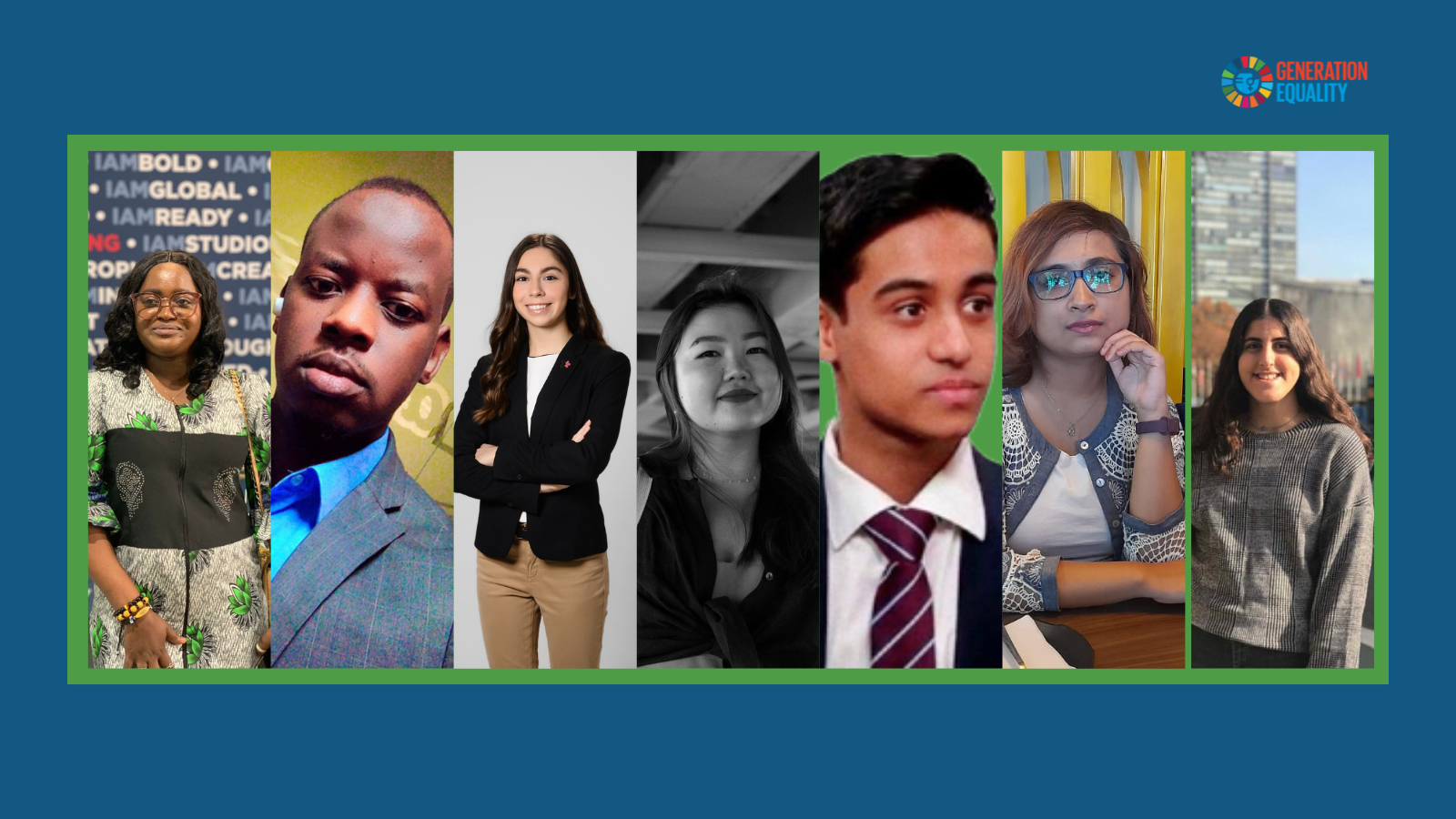

Image: A collage of National Gender Youth Activists
Generation Equality National Gender Youth Activists (NGYAs) and adolescent girl leaders have pushed the boundaries of what it means to engage in transformative, meaningful engagement in feminist movements. In the past two years, and as part of their strategic work, NGYAs and adolescent girl leaders have impacted the global gender equality agenda in numerous ways varying from international, intergovernmental forums to grassroots and localized advocacy. We celebrate this work and the impact seen on local, national, regional, and international levels
“[Being an NGYA has] given me a platform to directly push for gender equality,” Atukwase, an NGYA from Uganda, shares. “It’s a critical aspect in both Uganda and globally. It’s a human right and essential in achieving peace and sustainable development.” Rym, an adolescent girl leader from Lebanon, noted, “What has been particularly valuable is the opportunity to voice the concerns of my peers and to provide suggestions while knowing that there are people listening to us.” She continues, “it is important for me because [we know] that young people deserve to be part of the decision-making process and to hold decision-makers accountable,” while Oindrila, an adolescent girl leader from India notes, “I started believing more in the power of girls than ever before. It gave me the strength to start dialogues on feminism, climate action, and intersectionality in my organizations and community.”
Beyond working at the global level, the majority of NGYAs and adolescent girl leaders also organize and mobilize regionally and locally, sharing their messages on gender equality at the grassroots level. Sarah, an NGYA from Nigeria, explains, “I’ve been able to use [the] position [and] platform to do more to organize and put things together, coordinate and get some feedback and responses with young women.” Selin, an NGYA from Türkiye shared how “the more UN Women engages with young people, the more impactful UN Women gets. The moment [my community] realized that I work with UN Women, they started to listen, and then UN Women realized that they were being heard, which leads UN Women to make more progress about young people.”
Yet while NGYAs and adolescent girl leaders continue to advance their advocacy from global to local, they have also had a significant impact on UN Women’s work. Makhabbat, an NGYA from Kazakhstan, noted that NGYAs have “informed [UN Women] on youth activism and that our voice can be part of [UN Women’s] work.” She continues, “When we are seen as partners, we have a deeper sense of cooperation.” Ishaan, an NGYA from the United Kingdom adds, “We have seen the start of a very powerful shift from mere youth participation to starting to see aspects of co-leadership and co-creation, which has supported and acted as a catalyst for UN Women's work.”
The impact of NGYAs and adolescent girls speaks to the commitment of young leaders to advancing gender equality for all. Furthermore, their intersectional and intergenerational approach to advocacy has garnered attention not only towards their individual efforts but towards the larger group of NGYAs and adolescent girl leaders, upholding their rightful place at the table with decision-makers. However, more still needs to be done. UN Women is committed to promoting young feminist leadership grounded on principles of co-ownership, co-creation, substantive participation, transformative design and leadership, intersectionality, and accountability.
Building Support Ecosystems for Survivors of Sexual and Gender Based Violence (SGBV): Centre for Feminist Justice, One Future Collective
By: Vandita Morarka, Founder, CEO One Future Collective
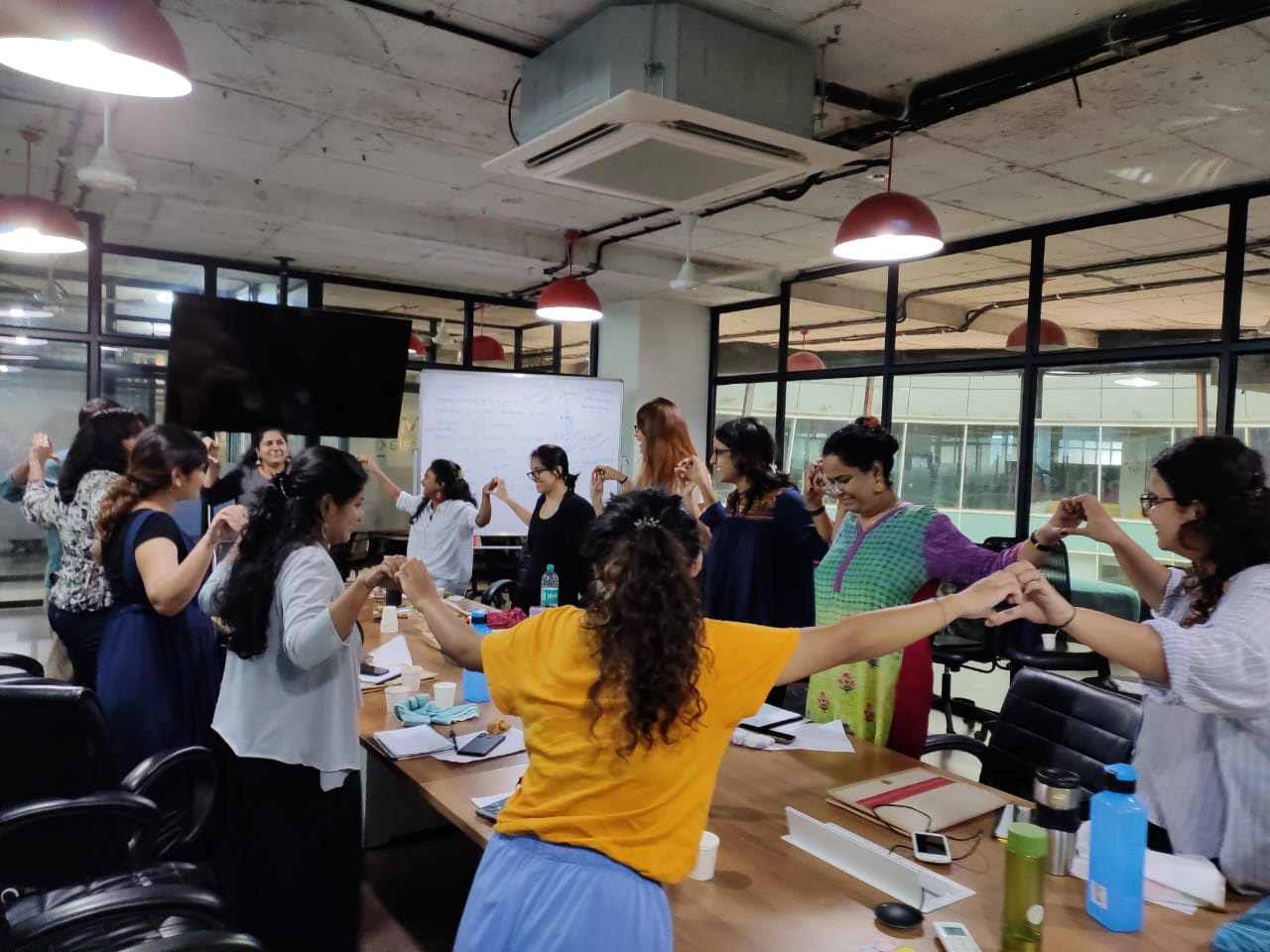
Photo: Our Future Collective
One Future Collective’s Centre for Feminist Justice is born out of the recognition that there is not and cannot be one universal definition of justice, not just for survivors of sexual and gender-based violence (SGBV), but also for the world. We believe that the current understanding of ‘justice’ limits the options that survivors of SGBV have access to - the formal legal system - a system which is often inaccessible, expensive, and a site that can cause excessive re-traumatization amongst survivors of SGBV. This is often limiting and far removed from some of the needs that survivors may have including the need for mental and physical health care, conflict resolution and de-escalation services, and sometimes, even an opportunity to engage with the harm-doers constructively.
We undertake a multi-prong approach to build a world that is suited to the needs of survivors. We offer direct services to survivors of SGBV through our FemJustice Helpline. Through the Helpline, we offer survivors pro-bono legal, mental health and social support. Additionally, we also engage in offering mediation, and conflict resolution services to ensure that survivors are able to prioritize and ensure their own safety and wellbeing. Our goal is to integrate restorative and transformative justice support for survivors of SGBV within the system to ensure that all survivors who approach us have something to take with them. So far, we have been able to provide direct support to over 10,000 survivors of SGBV.
We also invest in institutional strengthening by working with all service providers who may offer services to survivors of SGBV through advocacy as well as knowledge building. We have built and will continue to build a sustained network of different practitioners under the FemJustice Practitioners’ Network which currently has over 600 members.
Our work with survivors so far has highlighted the need for us to go beyond working with traditional service providers and develop capacities within different micro communities to be able to organize, develop and implement a strategy to intervene, reduce the intensity of violence, and facilitate a safe exit for the survivors of SGBV. We are currently setting up a distributed social support volunteer network that is regionally accessible and has the capacity to provide survivors with immediate, contextually relevant support.
Our ideal world is one in which SGBV does not exist. We realize that as we work on making that a reality, we cannot look past the current situation in which SGBV is rampant. Our work at the Center for Feminist Justice is guided with the motivation of providing survivors of gender-based violence with the world that they deserve - a world where their safety and well-being is prioritized and is accessible at all levels and at all times.
To participate and to know more about our work, subscribe to our mailing list.
I am a #HeForShe Champion
By: Bright Sibanda (BpS ADVOCATE)- A Generation Equality Action Coalition Youth leader on Gender Based Violence
Change needs to happen now! This song is meant to create awareness on ending Sexual and Gender Based Violence against women and girls. It seeks to draw the attention of men and boys and engage them as advocates and change agents who stand in solidarity with women and girls in advancing Gender Equality and Women's Empowerment (GEWE).
GBV cases are rising every day and the time for action is now. Say no to GBV! All men in action!
Listen here and spread the message!
Debt is a Feminist Issue
By: Selamawit Tezera
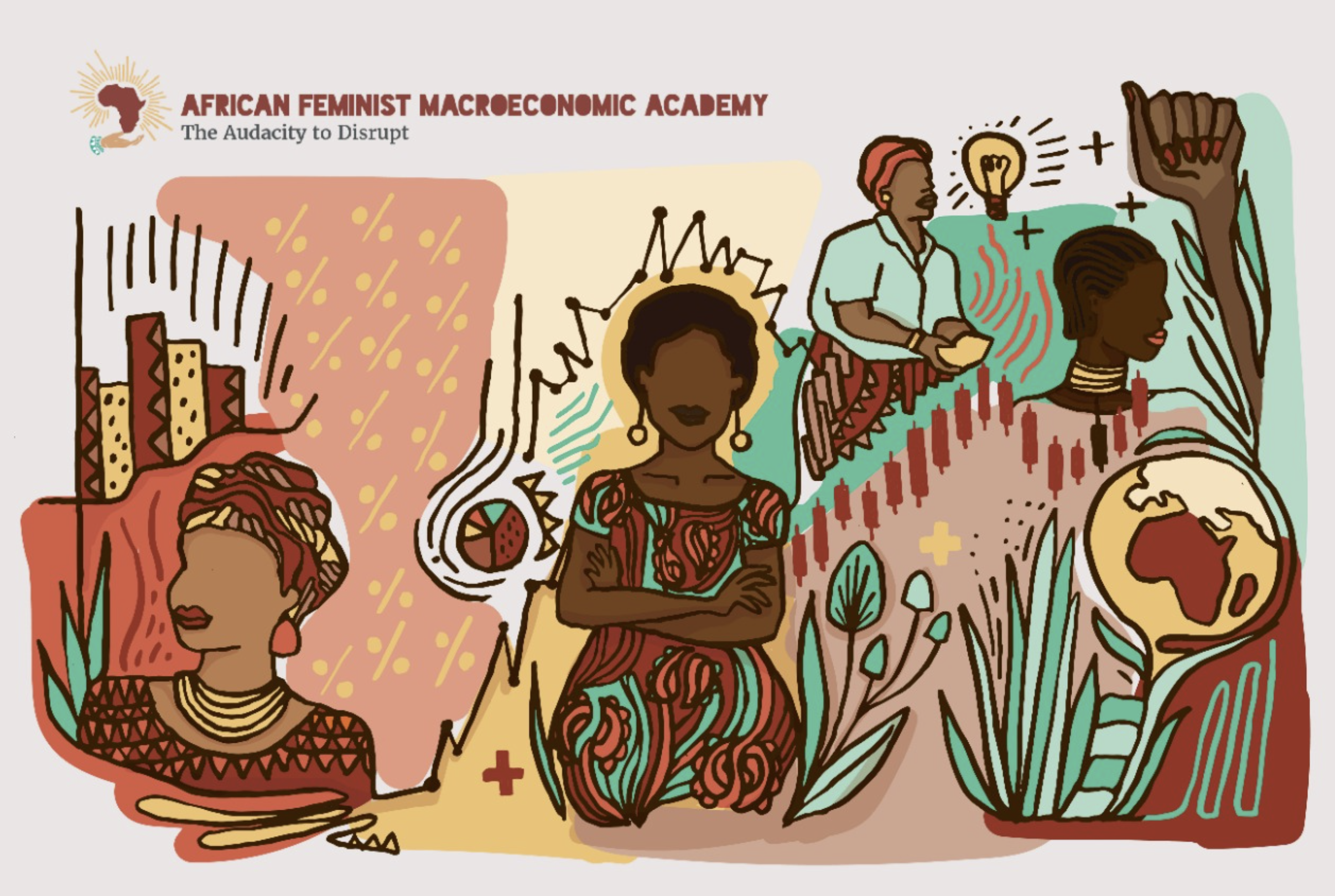
Illustration: FEMNET
Have you ever imagined a debt-free country where the government school and education system, infrastructures, government hospitals and healthcare services are not compromised? Have you ever imagined credit rating agencies being abolished? Have you ever wondered if every corner of Africa has clean water, power services, quality education, and healthcare services? Have you ever seen the government being accountable for its borrowing in the parliament? If you are ever asked to write to your future child about a debt-free country, what would that letter be?
In a letter to my future daughter on what a debt-free Africa looks like, I imagine what it would be like to live in a continent where its governments have paid all their debts and used their revenues effectively. I cannot stop thinking about the huge impact this would have on all girls living in rural areas, where the government won’t compromise the SDGs in the name of repaying debt and debt services. I also envision how this will open opportunities to all girls when they enter the workforce as I start to sketch out how their retirement and old age will look like. Debt affects what is available to be invested in the needs and rights of women and families in the country. Debt is a feminist issue.
As feminist collectives, we are bold to offer alternative lens to issues at hand; from politics, to current events, to employment and labor laws. But, too often, our analysis falls silent, or at best is very slim, on macroeconomic issues. Macroeconomic issues such as debt have been seen as concepts that can only be understood by a few economists. However, they have a huge impact at the individual level.
Evidence shows that there is a dearth of contextualized information and knowledge based on feminist analysis of critical macroeconomic policy issues and processes such as illicit financial flows, informal trade, unpaid care work, decent work, tax justice, international financial institutions in the region, and on the continent, to inform strategies for advocacy for women’s economic justice. Across the African continent, high numbers of women are engaged in informal and unpaid care work. About 90% of employed women are in informal employment. This means the macroeconomics gross domestic product accounting erases their contribution for their country as it doesn’t account unpaid care work and informal employment. A large percentage of the burden of this debt is placed on women's shoulders, yet the money lent seldom goes toward supporting women's rights work. This means many services including comprehensive sexual and reproductive health services are highly not funded.
Dealing with Macroeconomic issues is one of the priorities of governments. For countries like Ethiopia, foreign debt is believed to be the economic savior for the government to cover the high budget deficit as in most countries around the world. Debt has its cumulative impact for over decades. The question of what the gendered consequence of the debt crisis is has not been examined properly. It is particularly difficult for the governments to fulfill their pledges to gender equality and the advancement of women's rights because of the burden they bear in repaying public debt. Debt affects the cost of money, and therefore the economy and the creation of employment for its people. Two major components in debt architecture that need to be discussed; a broken global financial architecture that profits from debt and a weak institutional and policy framework at the national level to hold the government accountable for its debt. There has been very little movement to further reform the debt architecture and its actors such as the credit market behavior, credit rating agencies, arbitration and mediation mechanisms for restructuring, safeguarding clauses in debt contracts. This system has allowed the systematic indebtedness of vulnerable countries on the Continent to borrow at various levels with little accountability. Debt is a feminist issue and should be addressed!
Become a Signatory! WPS-HA Compact
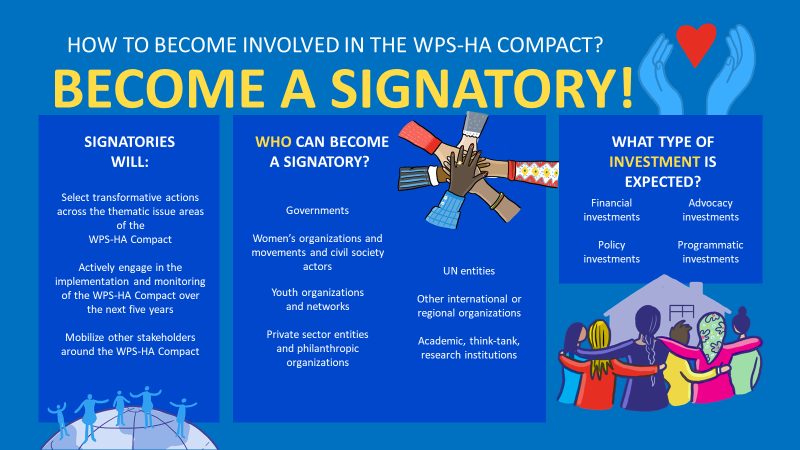
Image: WPS-HA Compact
Are you part of a youth-led or young-women-led organization or network?
Does your organization/network work on peacebuilding, gender equality and humanitarian action?
Would you like your organization/network to be part of a group of committed change-makers who strive to create meaningful and gender-responsive change for women of all ages and backgrounds?
If so, the Women, Peace and Security and Humanitarian Action Compact may be a great and unique platform for your organization/network to join.
The Compact on Women, Peace, and Security and Humanitarian Action (WPS-HA Compact) is an innovative multi stakeholder and inter-regional outcome of the Generation Equality Forum. The Compact seeks to drive a global movement for action on existing commitments on Women, Peace and Security and gender responsiveness in Humanitarian Action at the global, regional, national, and local level.
Who can become a Compact Signatory?
Individuals cannot join the Compact, however, if you are part of one of the stakeholders below, your entity can join the Compact.
- Youth Organizations and Networks
- Civil Society Organizations and Networks
- Governments
- UN Entities
- Academic Institutions
- The Private Sector
- International or Regional Organizations
As an inclusive platform, the Compact has a strong focus on harnessing meaningful intergenerational engagement through its mandate and actions. The Compact Framework has 10 youth-specific actions and all actions across the framework impact young women. While the Compact does not provide direct funding to Signatories to implement their actions, Signatories are encouraged to work together and form partnerships to implement their shared actions.
If you want to become a signatory visit the Compact website and join the movement
Be prepared: The Journey to CSW67 begins
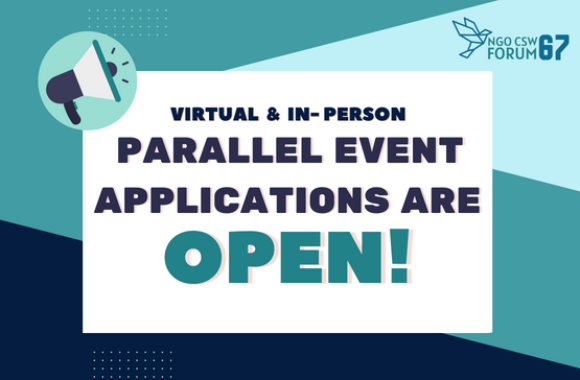
Image: NGO/CSW67
- The sixty-seventh session of the Commission on the Status of Women (CSW67) will take place from 6 to 17 March 2023, bringing together representatives of Member States, UN entities, and ECOSOC-accredited non-governmental organizations (NGOs) from all regions of the world. The forthcoming priority theme will be “Innovation and technological change, and education in the digital age for achieving gender equality and the empowerment of all women and girls.”
- Applications to host parallel events during the NGO/CSW Forum during the session are now open and will run until December 5th. Civil Society Organizations can apply to host parallel events regardless of their ECOSOC status. Although organizations may apply for only one in-person event, they can apply for more than one virtual event. Register here for In-person events and Virtual events. For any question on parallel events, please email info@ngocsw.org.
- Plans for CSW have commenced. Be prepared to start engaging in country consultations. 45% of the world’s internet users are under 25, and 30% of the world’s youth have been active online for at least five years[1]. With the growing rate of young people utilizing technology, the internet is playing a central role in young people’s rise to prominence on a global scale and has helped them to mobilize, collaborate, and share a platform for their voices. While significant advances have been made in young people’s ability to learn and connect with one another, the digital divide remains a significant human right concern. Your participation and engagement is crucial in developing recommendations for the 67th session of the commission. For any queries, contact us on youth.engage@unwomen.org
Upcoming Opportunities
- Adolescent Girls Investment Plan - Adolescent Girls Advisory Committee (10- 19 years) and (20 -24years)
- Department of Global Communication - Intern Public Information
- Department of Peace Operations - Intern Political Affairs
- Department of Peace Operations - Intern Public Information
- Office of the Commissioner for Human Rights - Intern Human Rights
- Office of the Special Representative to the Secretary-General on Violence Against Children - Intern Human Rights
- United Nation Academic Impact - Millennium Fellowship
- UNESCO MGIEP - YouthWagingPeace Ambassadors Programme
- UNDP - Digital Communications and Social Media Intern
- UNDP - Data Visualization Intern
- UNDP - Conscious Food System Alliance (COFSA) Intern
- United Network of Young Peacebuilders - Communications Coordinator
- UN Young Professionals Programme - Legal Affairs
- UN Young Professionals Programme - Library and Information Management
Resources
- The International Trans Fund (ITF) is pleased to announce its 7th grant cycle. Applications are welcome from trans-led organizations with budgets below $100,000$ based in any region of the world. Deadline for applications is December 12, 2022. Apply here.
- Youth4COP27 has produced a toolkit that includes a calendar of all the youth-focused events at COP27, a schedule of the many pavilions, and the tips and tricks you need to make the most out of your advocacy at the global climate forum is available here.
- The UN Women Europe and Central Asia Regional office will convene a Youth Forum organized by Generation Equality National Gender Youth Activist (NGYAs) from the 6 - 8 December in Istanbul, Turkey. Watch this space for more information about the modalities of engagement.
- Women Win officially launched the FREE STEM Fund that focuses on narrowing the gender gap in the Science, Technology, Engineering and Mathematics fields. This initiative is open to registered and unregistered initiatives, groups, collectives, and organizations with a focus on the rights of girls, women, transgender and non-binary people based in the Global South. Find more information here on how to apply and send in an application by the 1st of December.
- A Call for Proposal to support Afghan civil society organizations and their efforts towards advancing women's rights and gender equality in Afghanistan, with a focus on small women-led and women's rights civil society organizations is open. Read more for eligibility
- Want to develop “win-win” solutions for gender equity and climate resilience in your community? Apply to the Youth Climate Solutions Challenge! The top teams will win prize funding for implementation. Sign up
- The United Nations Alliance of Civilizations (UNAOC) and the BMW Group, with the support of Accenture, launched the call for applications for the Intercultural Innovation Hub. Grassroots initiatives, including youth-led organizations, that encourage intercultural understanding and promote inclusive and diverse societies through innovative methods are encouraged to apply Deadline for applications is Friday December 2nd, at 5:00 PM EDT.
[1] https://www.un.org/youthenvoy/information-communication-technology/
